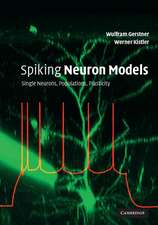Human Brain Theory: Information-Commutation Device of the Brain & Principles of its Work & Modeling
Autor Andrey S Bryukhovetskiyen Limba Engleză Hardback – apr 2016
Preț: 1207.58 lei
Preț vechi: 1549.75 lei
-22% Nou
Puncte Express: 1811
Preț estimativ în valută:
231.08€ • 247.09$ • 192.66£
231.08€ • 247.09$ • 192.66£
Carte disponibilă
Livrare economică 28 martie-11 aprilie
Preluare comenzi: 021 569.72.76
Specificații
ISBN-13: 9781634847414
ISBN-10: 1634847415
Pagini: 160
Dimensiuni: 155 x 230 x 19 mm
Greutate: 0.59 kg
Editura: Nova Science Publishers Inc
Colecția Nova Science Publishers Inc
ISBN-10: 1634847415
Pagini: 160
Dimensiuni: 155 x 230 x 19 mm
Greutate: 0.59 kg
Editura: Nova Science Publishers Inc
Colecția Nova Science Publishers Inc
Cuprins
Introduction; Neurology & Neural Research in the Early 21st Century; Contemporary Scientific Concepts of the Human Brain Operation & Organization; Current Global Research of Brain: Theoretical, Methodological & Technological Bases for the Discoveries, Inventions & Innovations in Contemporary Neuroscience; A System Approach as the Basic Methodology of Contemporary Neuroresearch: Its Advantages & Disadvantages; An Information Approach to the Fundamental & Theoretical Research of the Brain; The Theory of the Information-Commutation Organization of Human Brain & Its Operations Principles; The Methodology & Technologies of Developing 3D Virtual Models of the Brain; Methodological Errors & Systemic Errors of Theoretical Neurology in the Development of 3D Virtual Models of Brain; The Methodology to Develop a 3D Simulation of the Brain Using the Information Approach; The Future of Theoretical Neurology in Clinical Medicine, the Mathematical Modeling of the Brain & the Development of a Brain-Computer Interface; Conclusion; References; Index.











